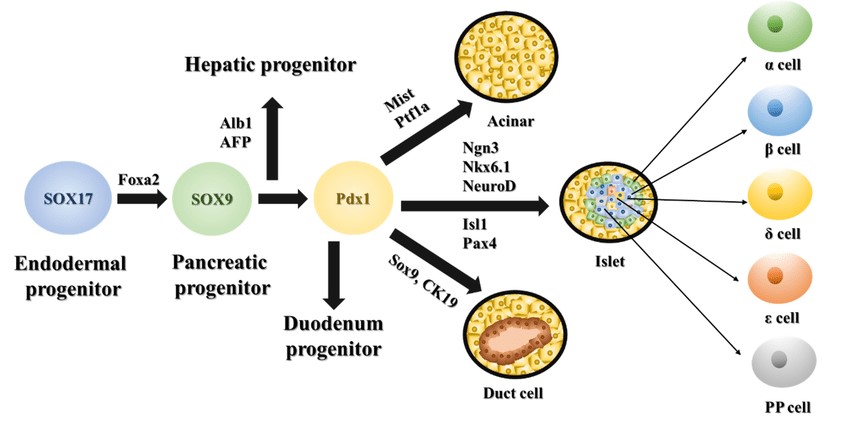Hepatic and Pancreatic Progenitor Cell Transcription Factors
Related Symbol Search List
Immunology Background
Overview of Hepatic and Pancreatic Progenitor Cell Transcription Factors
The liver and pancreas are vital organs in the human digestive system that perform a variety of functions such as metabolism and hormone secretion. Hepatic and pancreatic progenitor cell transcription factors are important in regulating the development and function of these organs. Researchers have intensively studied the functions, interactions, and effects of these factors on cell fate decisions. For example, transcription factors such as FOXA2, SOX9, and PDX1 play key roles in the directed differentiation of hepatic and pancreatic progenitor cells (as shown in Figure 1). Researchers have also investigated the functions and regulatory mechanisms of these transcription factors by simulating embryonic developmental processes, such as induced pluripotent stem cell differentiation.
 Fig.1 Schematic diagram of key transcription factors regulating pancreas development. (Weng CC, et al., 2019)
Fig.1 Schematic diagram of key transcription factors regulating pancreas development. (Weng CC, et al., 2019)
Research Areas of Hepatic and Pancreatic Progenitor Cell Transcription Factors
The study of hepatic and pancreatic progenitor cell transcription factors is intended to provide insight into the differentiation and function of these cells during embryonic development and adult physiology.
- Embryonic development
Hepatic and pancreatic progenitor cell transcription factors are key regulators in embryonic development. Exploring the expression patterns and functions of these transcription factors in embryonic development can help to understand the process of formation of these two organs.
- Cell differentiation
Investigating the exact role of hepatic and pancreatic progenitor cell transcription factors in the differentiation process and how they regulate gene expression, which determines the direction of cellular specialization, can help to understand how liver and pancreatic precursor cells differentiate into mature hepatocytes and pancreatic cells.
- Disease research
Some diseases, such as cirrhosis and insulin resistance, are associated with changes in hepatic and pancreatic progenitor cell transcription factors. Researchers are trying to understand which transcription factors are abnormally expressed in these diseases that lead to altered pathophysiology and to find potential therapeutic strategies.
- Tissue regeneration
The liver and pancreas are organs with great regenerative capacity. Studying hepatic and pancreatic progenitor cell transcription factors can reveal how these organs re-form and regain function during regeneration.
- Transgenic research
By modifying the gene expression of specific hepatic and pancreatic progenitor cell transcription factors, researchers can study the effects of these factors on cell differentiation and function. Such transgenic studies help to unravel the mechanisms by which these transcription factors contribute to cell-directed differentiation, as well as their potential value in modulating specific strategies or therapeutic approaches.
In summary, the areas of research on hepatic and pancreatic progenitor cell transcription factors involve embryonic development, cell differentiation, disease mechanisms, tissue regeneration, and transgenic studies. These studies have important implications for understanding the development, function, and treatment of related diseases in these two organs.
Studies on hepatic and pancreatic progenitor cell transcription factors have made important progress in revealing the molecular mechanisms underlying organ development and function. Further studies will help us gain insights into the biological processes of the liver and pancreas and provide new strategies and therapeutic tools for the treatment of related diseases. The application of these transcription factors in the field of regenerative medicine and tissue engineering also has great potential to bring hope and prospects for human health.
Reference:
- Weng CC, Lin YC, Cheng KH. The Use of Genetically Engineered Mouse Models for Studying the Function of Mutated Driver Genes in Pancreatic Cancer. J Clin Med. 2019;8(9):1369. Published 2019 Sep 2. doi:10.3390/jcm8091369.

